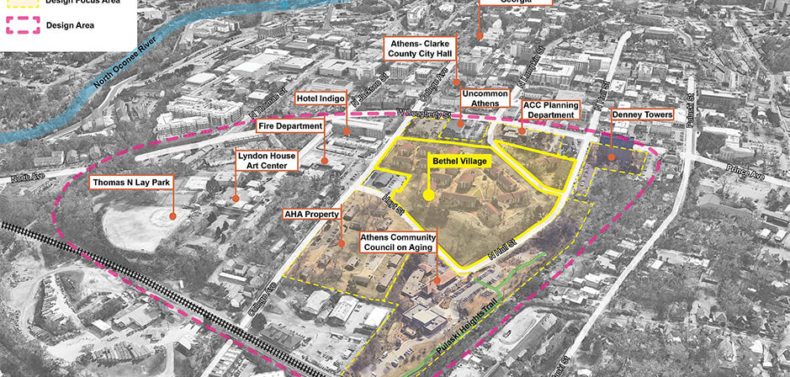Athens-Clarke County commissioners voted to spend another $4 million on an already over-budget affordable housing project and wind down a program to prevent evictions during a Nov. 15 called meeting.
The county had initially given the Athens Housing Authority $4 million in federal funds as a bridge loan for the Bethel Midtown Village redevelopment—known as the North Downtown Project—until the Georgia Department of Community Affairs came through with a $4 million grant to offset increased construction costs as a result of inflation and shortages of materials. But now the AHA/ACC/Columbia Residential public-private partnership will keep that money, in addition to the DCA grant, because construction costs have risen even further, along with interest rates.
With $39 million in county sales tax revenue already committed and $22 million in DCA tax credits on the line, the project has to keep moving forward in spite of spiraling costs, AHA Executive Director Rick Parker said. “I think this is well beyond the comfort zone of both parties,” he said. “The reason to continue down this path is not to lose the affordable housing tax credits, which expire at the end of this year.”
In between May, when the partnership applied for more DCA funds, and October, when the $4 million grant was awarded, interest rates rose by two percentage points, Parker said. He said he and Mayor Kelly Girtz both sought additional funding from DCA on top of the latest $4 million, but DCA declined.
The $4 million expenditure drained the last of the $11 million the ACC Commission set aside for affordable housing from its $60 million share of the American Rescue Plan Act’s federal funding for state and local governments’ pandemic recovery. Commissioner Jesse Houle raised the question, if cost overruns keep happening, where will the money to cover them come from? “I have a fear within me about how we get through phases 2, 3, 4 and 5 when we have no more money on our end to put into it,” Houle said.
The North Downtown Project is currently in phase 1, which involves tearing down part of the existing Bethel, installing infrastructure and building one new building. When complete, the development will replace 190 aging Section 8 units with 715–875 new ones—one-third public housing, one-third subsidized and one-third market rate.
“This is an extraordinary set of circumstances,” Parker said. “We’ll solve that problem as we go. We’ll do that in a variety of ways.”
The AHA locked in an interest rate that saved $2.5 million, Parker said, but it expires Jan. 5. In addition, the team in charge of the project pre-bought materials to lock in prices, is looking at design changes and is negotiating with contractors on cost-cutting incentives. He also said he expects the federal government to step in and provide relief for similarly struggling projects nationwide, based on his past experience in the wake of the 2007 housing crisis.
“I believe we’re not just simply going to stop building affordable housing in America because of the economics and the inflation going on,” Parker said. “I believe this will be addressed by a combination of: inflation will eventually moderate, interest rates will stabilize, and additional resources will be provided.”
The commission also voted to wind down an eviction prevention program run by a new and inexperienced nonprofit, First Athenian Development Corp., after a county report detailed numerous accounting irregularities dating back to June that led ACC Manager Blaine Williams to suspend the program last month.
At least 19 households had been approved for help when the program was suspended, and there may be up to 50 more in the pipeline, Williams said. The ACC Housing and Community Development Department will assist those applicants, and then it will end, unless the commission opts to reopen bidding to run it. “We can’t take over the program,” Williams said. “We don’t have the capacity.”
In less than a year, the program prevented about 300 evictions by using $1 million of the $2.5 million in ARPA funds the commission allocated for that purpose. However, as the end of the federal eviction moratorium last November grows further away, it becomes harder to pin evictions on COVID-19, according to Williams. Both DCA and Gwinnett County—whose Project RESET provided the model for Athens’ program—stopped accepting applications for eviction prevention assistance in late October.
However, housing assistance is available from local nonprofits Advantage Behavioral Health Systems, Family Promise, Project Safe, Acceptance Community Center and The Ark that split $800,000 the commission recently awarded for rehousing from another federal source, Community Development Block Grants.
Like what you just read? Support Flagpole by making a donation today. Every dollar you give helps fund our ongoing mission to provide Athens with quality, independent journalism.










